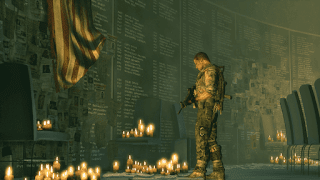Spec Ops: The Line, game by Yager Development, is a 3rd person, squad-based action game with a story meant to be a deconstruction on the elements of war and how players view violence in games.
I will admit it might come off a bit pretentious in its messaging but if one is willing to look past it and try and reflect on the story and the actions the player does over the course of story then one can see there has been thought put into its messaging.
Besides the message the wishes to convey, it does something that should be done more often in games and that is the gradual change in character.
At the game start, the player and their group acts strictly professional manner with in-combat being clean actions and organised call-outs. Over the course of the journey, the characters visually degrade and as they do their combat takes on new characteristics and it devolves in sloppier posture, their animation more aggressive and their call-outs more visceral.
In that aspect the developers really captured the "descent into darkness" feel
and it one of its most worthwhile achievements.
The combat probably feels sluggish by today's standard, but I feel it is by
design and when one gets used to it, one can appreciate the care placed in the
set pieces with and combat engagements, with memorable moments throughout. The
team dynamic is the key to a smoother combat experience and utilising it with
environmental hazards and the call outs make combat feel dynamic even if the
world itself is a static story.
It is weaving a meta-narrative, some of the worse actions that happens in the game, the player does technically pull the trigger for. There are only a few places where something happens to characters that is out of the their control, but almost all the responsibility of action is placed on the notion that they are in control and by continued participation, complicit in the actions and consequences thereof.
The player can do some truly cruel actions and in the moment they can feel justified, if not the player then the protagonist character will do the justification for you.I would say the narrative execution is a bit messy, message gets jumbled in the action and it does try to bludgeon the point when one gets to the later half of the story, however when end is in sight and the last vestiges of resistance is desperately trying to stop you, the objective is completed and the final pay off is in sight, it slows down and asks questions, it makes one to see the truth to their actions and on surveying the handiwork there is a moment of introspection and reflection
In these final moments, its gives the player the option how they wish to end the story, it forces a choice whether you feel what you have done is justified and in how the ending moments gives the player agency how they wish for this story to be concluded. These moments are a great opportunity to consider all the actions that took place throughout the game and how easy it was to justify the actions that took place believing you are the "hero" to a story that really conveys tragedy and how quickly one can slip into being a "bad guy" when convinced "your side" is in the right.
It is an anti-war game at its core and tries to confront the player to, at the very least, look at the actions they have committed and think on it.
It tries to show how easy it is to rationalise a violent cause and what
effects this can have on an individual and those around you. It shows how
quickly a slippery slope can form and how damaging a "main character syndrome"
can be as it tries to mirror a player's modern shooter expectations with an
attempt at reflecting that in a realistic type of scenario.
Images Source:
Video Source:




Comments
Post a Comment